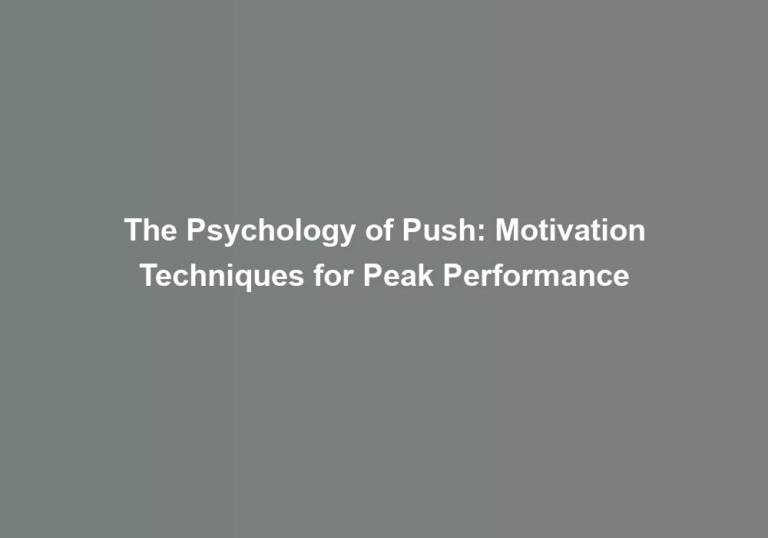Mental Grit in Fitness: Unlocking Motivation Through Exercise Psychology
Feeling like you need an iron will to stick to your fitness routine? ThereG??s no denying that maintaining motivation for exercise can be a formidable challenge. However, understanding the underlying psychology behind your drive to stay fit can be the key to unlocking a sustainable and effective approach to achieving your fitness goals. By delving into the realm of exercise psychology, you can discover how mental grit can be cultivated to propel you towards success in your fitness journey.
Understanding Mental Toughness
Unlocking the potential of mental toughness can be a transformative journey in your pursuit of peak performance and resilience. Understanding mental toughness is the cornerstone of resilience training. ItG??s about developing the mental strength techniques that will help you navigate the challenges you face on your fitness journey.
Resilience training is not just about bouncing back from adversity, but also about using that adversity to propel you forward. ItG??s about harnessing the power of your mind to stay focused and motivated, even when the going gets tough. Mental strength techniques are not something youG??re born with; theyG??re skills that can be developed and honed over time. By incorporating strategies such as visualization, positive self-talk, and goal setting, you can cultivate the mental toughness needed to overcome obstacles and achieve your fitness goals.
When you understand the inner workings of mental toughness, you gain a deeper insight into your own capabilities. You realize that setbacks are not roadblocks but stepping stones. You recognize that your mindset has a profound impact on your ability to push through challenges and stay committed to your fitness journey. This understanding empowers you to embrace the discomfort, knowing that it is an essential part of growth and progress.
As you continue to delve into the realm of mental toughness, remember that itG??s not about being fearless or invincible; itG??s about being resilient and determined. ItG??s about acknowledging your fears and doubts while choosing to move forward despite them. Embrace the process of building mental toughness, and youG??ll find yourself not only achieving peak performance but also experiencing a profound sense of belonging within your own journey.
The Psychology of Motivation
Discovering what truly drives you to take action in your fitness journey can offer profound insights into the psychology of motivation. Understanding the psychology of motivation can empower you to reach your fitness goals by harnessing the power of your mind. Motivation techniques and cognitive behavior play a pivotal role in shaping your fitness journey.
Motivation techniques are essential tools that can help you stay on track and consistently work towards your fitness aspirations. One effective technique is setting specific, measurable, achievable, relevant, and time-bound (SMART) goals. By doing so, you create a roadmap that keeps you motivated and accountable. Additionally, positive reinforcement and self-talk can significantly impact your motivation. Celebrating small victories and using affirmations can boost your confidence and keep you driven.
Cognitive behavior is another crucial aspect of the psychology of motivation. It involves understanding how your thoughts and feelings influence your behavior. By recognizing and challenging negative thoughts, you can reframe them into positive, motivating forces. For example, instead of fixating on a missed workout, you can focus on the progress youG??ve made so far and use it as fuel to propel you forward.
Overcoming Fitness Obstacles
Understanding the psychology of motivation equips you with the tools to overcome fitness obstacles and stay on track towards your goals. When faced with challenges, itG??s essential to adopt a mindset shift and employ perseverance techniques to push through. Here are some strategies to help you overcome common fitness obstacles:
| Fitness Obstacle | Perseverance Technique |
|---|---|
| Lack of Motivation | Set small, achievable goals and celebrate each accomplishment along the way. Surround yourself with supportive individuals who inspire and motivate you. |
| Time Constraints | Prioritize your fitness routine by scheduling it into your daily calendar. Remember that even short bursts of exercise can make a difference. Find a workout buddy to hold you accountable and make the experience more enjoyable. |
| Plateauing Progress | Embrace variety in your workouts to keep things interesting and challenge different muscle groups. Focus on the journey, not just the destination, and celebrate non-scale victories like increased stamina or improved form. |
Strategies for Sustaining Focus
To sustain focus and motivation during your exercise routine, itG??s essential to implement strategies that align with your personal goals and values. Sustaining endurance requires mental toughness and the ability to stay focused when distractions arise. One effective strategy is to break down your workout into smaller, manageable segments. By focusing on completing each segment, you can maintain your concentration and motivation throughout the entire session. This approach not only helps you stay mentally engaged but also provides a sense of accomplishment with each completed segment, which can further fuel your motivation.
Concentration techniques are also valuable for sustaining focus during your workout. One powerful technique is mindfulness – the practice of being fully present and engaged in the current moment. By directing your attention to the sensations of your body and the rhythm of your breath, you can create a deeper connection to your workout, enhancing your endurance and mental fortitude. Additionally, using positive self-talk can help you stay focused and motivated. Remind yourself of your goals, affirm your capabilities, and celebrate your progress. By cultivating a positive and supportive inner dialogue, you can sustain your focus and stay motivated throughout your fitness journey.
Incorporating these strategies into your exercise routine can help you sustain endurance and maintain focus, leading to a more fulfilling and effective workout experience. Remember, your mental resilience and determination are just as important as your physical strength.
Achieving Fitness and Mental Benefits
As you sustain endurance and focus in your workout routine, you will discover the multitude of fitness and mental benefits waiting to be unlocked through your dedication and perseverance. Physical resilience is one of the key benefits you will achieve through regular exercise. Your body will become stronger and more capable of enduring physical challenges. This newfound strength and resilience will not only improve your overall health but also boost your confidence in your bodyG??s abilities.
Moreover, engaging in regular physical activity has a profound impact on your emotional well-being. Exercise triggers the release of endorphins, often referred to as the bodyG??s natural feel-good chemicals. These endorphins can help you manage stress, reduce feelings of anxiety and depression, and enhance your overall mood. As you continue on your fitness journey, you will likely notice an increased sense of well-being and improved self-esteem.
Furthermore, achieving fitness and mental benefits through exercise can contribute to a sense of belonging. When you participate in group fitness activities or sports, you have the opportunity to connect with like-minded individuals who share your passion for physical activity. This sense of community and shared goals can provide a powerful source of motivation and support, enhancing both your physical and mental well-being.
Conclusion
So, next time you hit the gym, remember that mental grit is the key to unlocking your motivation. ItG??s not about giving up when it gets tough, but pushing through and embracing the challenge. Because, letG??s face it, who doesnG??t love the feeling of accomplishment after a killer workout? Keep pushing past those obstacles, and youG??ll not only achieve your fitness goals, but also experience the mental benefits of strength and resilience. You got this!







